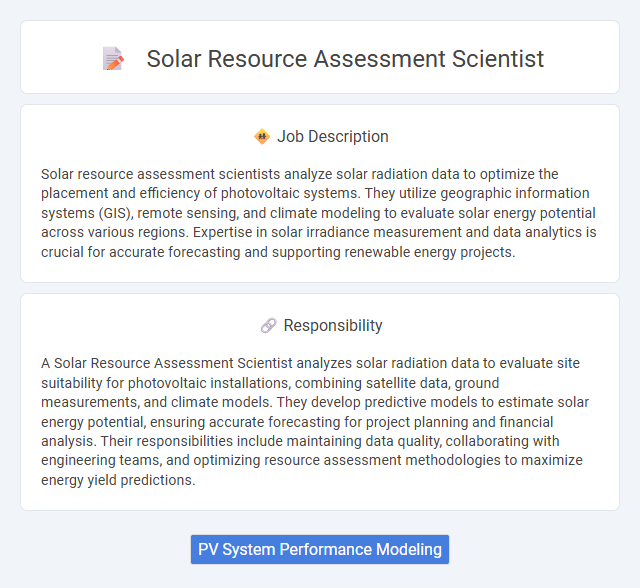
Solar resource assessment scientists analyze solar radiation data to optimize the placement and efficiency of photovoltaic systems. They utilize geographic information systems (GIS), remote sensing, and climate modeling to evaluate solar energy potential across various regions. Expertise in solar irradiance measurement and data analytics is crucial for accurate forecasting and supporting renewable energy projects.
Individuals with a strong background in environmental science, data analysis, and a passion for renewable energy will likely find a career as a solar resource assessment scientist suitable. Those comfortable with fieldwork, complex meteorological data interpretation, and advanced modeling techniques may thrive in this role. Candidates lacking analytical skills or interest in sustainable energy might struggle to meet the demands of the position.
Qualification
A Solar Resource Assessment Scientist requires expertise in solar energy systems, meteorological data analysis, and geographic information systems (GIS). Proficiency in analyzing satellite data, climate modeling, and solar radiation measurement techniques is essential for accurate resource evaluation. Advanced degrees in environmental science, renewable energy, or engineering, combined with experience in solar project feasibility studies, enhance qualification strength.
Responsibility
A Solar Resource Assessment Scientist analyzes solar radiation data to evaluate site suitability for photovoltaic installations, combining satellite data, ground measurements, and climate models. They develop predictive models to estimate solar energy potential, ensuring accurate forecasting for project planning and financial analysis. Their responsibilities include maintaining data quality, collaborating with engineering teams, and optimizing resource assessment methodologies to maximize energy yield predictions.
Benefit
Solar resource assessment scientists likely contribute valuable insights that improve the accuracy of solar energy forecasts, enhancing the efficiency of solar power systems. Their expertise probably supports investment decisions by providing reliable data on solar irradiance and site conditions, reducing financial risks. This role may also play a crucial part in advancing renewable energy projects, potentially accelerating the transition to sustainable energy sources.
Challenge
Solar resource assessment scientists likely face challenges in accurately modeling solar irradiance due to atmospheric variability and limited ground-based measurement stations. Uncertainties in satellite data and climate patterns may complicate the prediction of solar energy potential in diverse geographic regions. Overcoming these obstacles probably requires advanced analytical skills and continuous updates to data interpretation methodologies.
Career Advancement
Solar resource assessment scientists play a critical role in evaluating solar energy potential to optimize renewable energy projects. Career advancement opportunities often include specializing in advanced photovoltaic data analysis, leading interdisciplinary research teams, or transitioning into managerial roles within energy consulting firms and utilities. Gaining expertise in geospatial technologies, climate modeling, and energy policy can significantly enhance prospects for leadership positions and influence in sustainable energy development.
Key Terms
PV System Performance Modeling
A Solar Resource Assessment Scientist specializing in PV system performance modeling conducts detailed analysis of solar irradiance data to optimize photovoltaic energy production. They utilize advanced simulation tools and climate data sets to predict energy yield and improve system design efficiency. Expertise in statistical modeling, solar resource measurement, and data interpretation is essential for accurate performance forecasting and maximizing renewable energy output.
 kuljobs.com
kuljobs.com